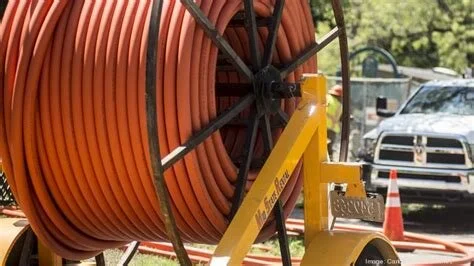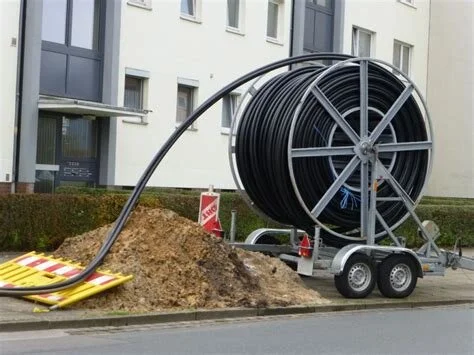Telecommunications Services - Public Sector Success Stories
Executive Summary - Success stories in public sector telecommunications and broadband services
Telecommunications services encompass cable TV, internet, business, and broadband internet phone services. There are generally several choices for broadband or telecommunications service providers by private sector companies in large urban areas. Private telecommunications companies have been serving smaller communities and rural areas also. However, many regions of the United States still do not have "broadband" services, as defined by the Federal Communications Commission (FCC) as a minimum of 25 Mbps (megabits per second) download speed and 3 Mbps upload speed.
Broadband services are defined by the FCC as a minimum of 25 Mbps download speeds and 3 Mbps upload speed.
There are over 300 municipalities and a number of electric cooperatives that provide local telecommunications services in the United States.
A common thread in establishing telecommunications services is community support, thorough planning, and a robust feasibility study process.
There are many resources available if your organization is considering providing telecommunications services.
The Public Sector can provide telecommunications services in underserved areas
The United States landscape has many examples of municipalities, utilities, and cooperatives successfully offering telecommunications services. The landscape also has some ventures that did not turn out so well, but I like to focus on the positive.
This article focuses on success and what those successful entities did to make their path easier by planning and executing their telecommunications business model. Here are some success stories.
Success case studies and resources
This section details resources of systems operated by municipalities, utilities, and co-ops. There are over 900 municipalities and hundreds of utilities and cooperatives that provide locally-controlled telecommunications services. The common theme in some of these success stories is that:
The communities were underserved with telecommunications services
The municipal entities had community support in achieving the vision of service
They fought the incumbent providers (these providers were aggressive in trying to keep their territory and keep the municipalities from providing service)
The municipalities put together reasonable feasibility studies to support decisions on if/when to proceed
The municipalities developed and executed a business plan to construct facilities
The defining moment of the story is that the feasibility plans were realistic in determining penetration rates for potential services.
Utility Accounting and Rates Specialists provides on-line/on-demand courses on operations and construction project accounting, rates, and management for new and experienced co-op and utility professionals and Board members. Click on the button to see a highlighted listing and description of our course offerings.
The following case studies and references will give food for thought on some of the success stories:
Here is how Chattanooga, TN Electric Power Board offers internet speeds of 1 gbs for mainstream service and up to 10 gbs for business service.
Powell, WY fought off challenges from incumbent providers to give citizens broadband service.
This map from Community Networks, shows systems, their stories, and service offerings.
This link from Broadband Now is a listing of municipal telecommunications providers and shows a number of price comparisons for broadband services at various speeds.
Are municipal telecommunications offering in your community’s future?
Suppose the private sector provides adequate telecommunications services at a reasonable price in a locality. In that case, there is not a need for the local municipality, utility, or electric co-op to step in to provide an alternative option. But, if an area is underserved with telecommunications services, a public sector option should be on the table. In some cases, the threat of the local municipality stepping into the future could spur action for improvement by the incumbent provider.
The road to a municipality, utility or electric co-op providing telecommunications services is long and filled with potholes along the way. There are many resources that can help navigate the process.
Municipal, utility, and electric co-op telecommunications services
There are many examples of municipalities, utilities, and cooperatives successfully offering telecommunications services. We’ve shown some case studies of success and resources that are available if your organization is considering going down this road.
The full course library contains over 30 hours of on-line/on-demand courses on operations and construction project accounting, rates, and management for new and experienced co-op and utility professionals and Board members. Also included are free videos on industry topics and free downloads that you can use in your day-to-day work right after download. Click on the button to see the full course library.
About Russ Hissom - Article Author
Russ Hissom, CPA is a principal of Utility Accounting & Rates Specialists a firm that provides power and utility cost of service and rate studies, expert witness, and consulting services, and online/on-demand courses on accounting, rates, FERC/RUS construction accounting, financial analysis, and business process improvement services. Russ was a partner in a national accounting and consulting firm for 20 years. He works with electric investor-owned and public power utilities, electric cooperatives, broadband providers, and gas, water, and wastewater utilities. His goal is to share industry best practices to help your business perform effectively and efficiently and meet the challenges of the changing power and utilities industry.
Find out more about Utility Accounting & Rates Specialists here, or you can reach Russ at russ.hissom@uarsconsulting.com.
The material in this article is for informational purposes only and should not be taken as legal or accounting advice provided by Utility Accounting & Rates Specialists, LLC. You should seek formal advice on this topic from your accounting or legal advisor.



